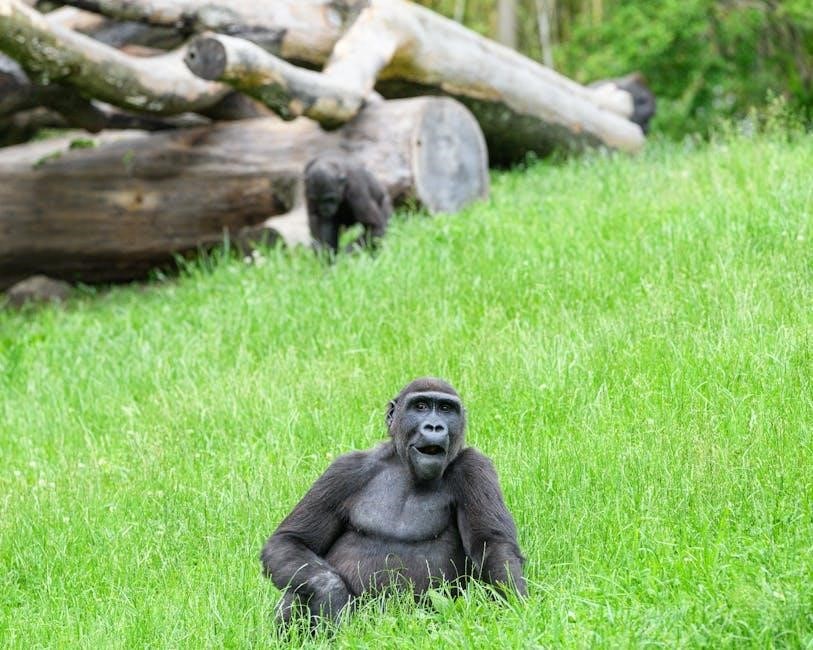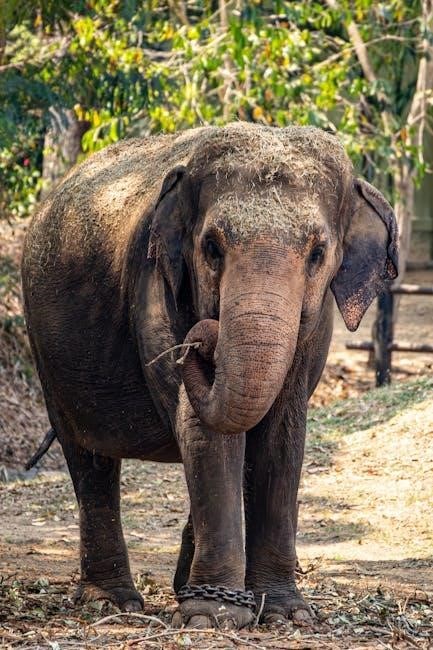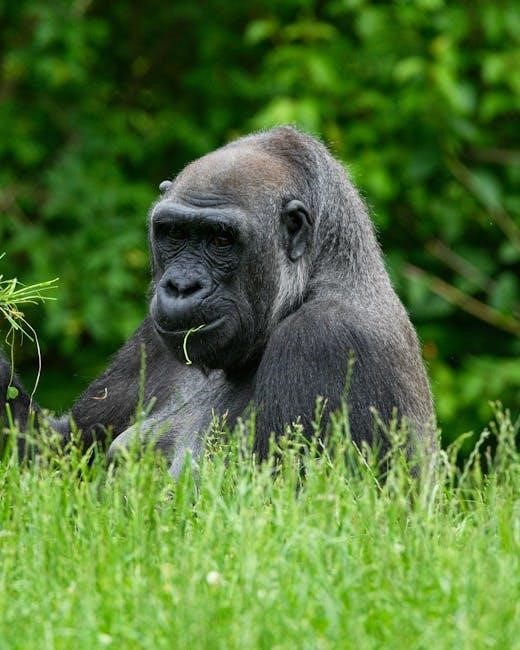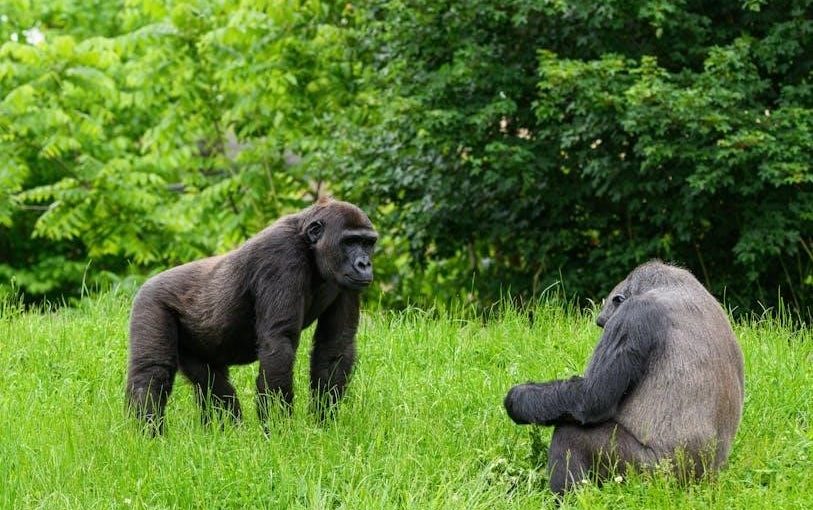The Jungle, written by Upton Sinclair, is a groundbreaking novel exposing harsh labor conditions in Chicago’s meatpacking industry during the early 20th century․ It highlights the struggles of immigrant workers through the story of Jurgis Rudkus, a Lithuanian immigrant, shedding light on social and economic injustices․ The novel became a catalyst for reform and remains a powerful critique of capitalism․ Its vivid portrayal of workplace exploitation sparked public outrage, leading to significant changes in food safety regulations․ Available as a free PDF, the book continues to resonate with readers today, offering insights into the lives of industrial workers and the fight for social justice․
1․1 Background of Upton Sinclair
Upton Sinclair, born on September 20, 1878, in Baltimore, Maryland, was a renowned American writer, journalist, and political activist․ His early life was marked by financial struggles, which deeply influenced his writing and advocacy for social justice․ Sinclair studied at the City College of New York and later at Columbia University, where he developed his literary skills․ He began his career as a writer, focusing on themes of inequality and exploitation, which became central to his work․ Sinclair’s commitment to socialism and his desire to expose societal injustices led him to write The Jungle, a novel that would become a landmark in American literature․ His work not only highlighted the plight of immigrant workers but also sparked significant reforms in labor and food safety laws․ Sinclair’s legacy as a muckraker and advocate for the working class endures, making him one of the most influential writers of his time․
1․2 The Novel’s Setting
Set in Chicago during the early 20th century, The Jungle vividly portrays life in the city’s sprawling meatpacking district, known as Packingtown․ This industrial area was home to countless immigrant workers, including the novel’s protagonist, Jurgis Rudkus, and his family․ The setting is characterized by the harsh realities of urban industrialization, with its labyrinth of factories, slaughterhouses, and overcrowded tenements․ Sinclair’s depiction of the filthy and dangerous working conditions in the meatpacking plants exposed the brutal truths of the industry, shocking readers and sparking outrage․ The novel’s setting also reflects the cultural and economic challenges faced by immigrants seeking a better life in America, highlighting the stark contrast between their expectations and the harsh realities they encountered; Through its setting, The Jungle paints a powerful picture of industrial exploitation and human resilience․
Publication and Availability
Published in 1906, The Jungle remains widely accessible․ The first edition is a valuable historical document, while free PDF and e-book versions ensure its continued reach and impact․
2․1 First Edition Details
The first edition of The Jungle was published in February 1906 by The Jungle Pub․ Co․․ This initial printing marked the novel’s debut in book form, following its serialization․ The edition is notable for its historical significance, capturing the raw, unedited version of Sinclair’s exposé on the meatpacking industry․ Published during a time of growing public concern over labor rights, the first edition became a landmark in American literature․ Its release coincided with the rising muckraking movement, amplifying its impact․ The original edition is now a rare collector’s item, sought after by scholars and enthusiasts alike․ Despite its age, the first edition remains a vital piece of history, showcasing Sinclair’s groundbreaking work in its purest form․
2․2 Free PDF Editions
The Jungle is widely available as a free PDF, thanks to its status as a public domain work․ Various platforms offer downloadable versions, including Project Gutenberg and Google Books․ These editions preserve the original text, allowing readers to access Sinclair’s powerful narrative without cost․ Volunteers and digitization projects have made the novel accessible to a global audience, ensuring its message of social justice endures․ The free PDF format has become a popular choice for students and researchers, facilitating easier access to this critical work of American literature․ Its availability online has also introduced Sinclair’s seminal work to new generations, maintaining its relevance in contemporary discussions on labor rights and economic inequality․ The free PDF editions ensure that The Jungle remains a vital resource for understanding historical and social issues․

Plot Summary
The Jungle follows Lithuanian immigrant Jurgis Rudkus as he navigates the harsh realities of Chicago’s meatpacking industry․ The novel exposes exploitation, poverty, and the struggle for survival in a ruthless capitalist system, highlighting the resilience of immigrant workers and their families․ Jurgis’s journey from hope to despair and eventual activism underscores the novel’s themes of social justice and economic inequality․ The tragic events, including the death of his wife Ona, emphasize the human cost of industrial exploitation․ Sinclair’s vivid portrayal of working conditions and personal struggles creates a powerful narrative that continues to resonate with readers today․
3․1 Main Characters
The novel revolves around Jurgis Rudkus, a young Lithuanian immigrant who embodies strength and resilience․ His determination to provide for his family drives the story․ Ona Lukoszaite, Jurgis’s wife, symbolizes innocence and tragedy, her fate reflecting the harsh realities of their environment․ Tamoszius Kuszleika, a musician and friend, represents the cultural ties and communal spirit of the immigrant community․ Other key figures include Marija Berczynskas, a strong-willed aunt, and Jonas Lukoszas, Ona’s brother, whose decisions impact the family’s fate․ These characters collectively illustrate the struggles of immigrant life and the devastating consequences of industrial exploitation․ Their stories intertwine to create a powerful narrative of hope, despair, and resilience in the face of overwhelming adversity․
3․2 Key Events
The novel begins with the wedding of Jurgis Rudkus and Ona Lukoszaite, marking a hopeful start for their immigrant family․ However, their optimism fades as they face exploitation in Chicago’s meatpacking industry․ Jurgis’s relentless work in brutal conditions leads to injuries, while Ona, forced into prostitution to survive, ultimately dies in childbirth․ These tragic events underscore the family’s descent into despair․ Jurgis’s journey through poverty, imprisonment, and eventual radicalization highlights the novel’s critique of capitalism․ The death of Jurgis’s son, Antanas, symbolizes the devastating consequences of industrial exploitation․ These key events collectively paint a harrowing picture of immigrant life and the failures of the American Dream, driving home Sinclair’s message of social and economic injustice․ The novel’s dramatic twists and turns emphasize the human cost of industrialization․
Major Themes
The Jungle explores themes of social justice and economic hardship, highlighting the exploitation of immigrant workers in Chicago’s meatpacking industry․ It advocates for labor reforms and workers’ rights․
4․1 Social Justice
Social justice is a central theme in The Jungle, as Upton Sinclair vividly portrays the exploitation of immigrant workers in Chicago’s meatpacking industry․ The novel exposes the harsh working conditions, meager wages, and lack of rights faced by laborers, emphasizing their struggle for fairness and equality․ Through the protagonist Jurgis Rudkus, Sinclair illustrates the systemic oppression and the fight for workers’ rights, inspiring public outrage and calls for reform․ The novel not only critiques capitalism but also advocates for collective action and social change, making it a powerful commentary on the need for justice in society․ Available as a free PDF, the book remains a significant resource for understanding these issues in the early 20th century․

4․2 Economic Hardship
Economic hardship is a pervasive theme in The Jungle, as Upton Sinclair vividly depicts the struggles of immigrant workers in Chicago’s meatpacking industry․ The novel highlights the exploitative wages, unsafe working conditions, and lack of job security faced by laborers․ Characters like Jurgis Rudkus endure relentless toil for meager pay, barely surviving in a system designed to exploit․ Sinclair exposes the harsh realities of wage slavery, where workers are trapped in a cycle of poverty, unable to escape the grip of industrial capitalism․ The novel illustrates how economic hardship destroys families and communities, pushing them to the brink of despair․ Available as a free PDF, the book remains a stark reminder of the economic struggles faced by workers in the early 20th century and the urgent need for systemic change․

Historical Context
The Jungle is set in the early 20th century, reflecting the harsh realities of Chicago’s meatpacking industry during the Industrial Revolution․ The novel exposes the exploitation of immigrant workers, highlighting the grim conditions and labor abuses prevalent at the time․ Sinclair’s depiction of the era sparked widespread outrage, leading to reforms in labor practices and food safety regulations․ The historical context underscores the struggles of working-class immigrants and the societal changes they endured․
5;1 Life in Chicago’s Meatpacking District
Life in Chicago’s meatpacking district during the early 20th century was marked by extreme hardship and exploitation․ Immigrant workers, like Jurgis Rudkus in The Jungle, faced grueling conditions in the factories, with long hours, low wages, and unsafe environments․ The meatpacking plants were notorious for their disregard of worker safety, leading to frequent accidents and illnesses․ Housing in the district was overcrowded and unsanitary, further exacerbating the struggles of the working class․ The lack of labor protections and the dominance of industrial giants created a system of exploitation that trapped many in a cycle of poverty․ Sinclair’s vivid portrayal of these conditions exposed the harsh realities of industrial life, shocking the public and prompting calls for reform․ The district’s environment was both physically and morally oppressive, reflecting the broader social and economic challenges of the time․

Muckraking Movement
The Muckraking Movement exposed societal issues through investigative journalism․ Upton Sinclair’s The Jungle was pivotal, revealing harsh labor conditions and sparking reform․ It remains a significant work in this genre․
6․1 Role of The Jungle
The Jungle played a pivotal role in the Muckraking Movement by exposing the harsh realities of Chicago’s meatpacking industry․ Upton Sinclair’s vivid depiction of unsanitary conditions, exploitation of workers, and the plight of immigrants sparked widespread outrage․ The novel revealed how industrial capitalism prioritized profits over human welfare, leading to significant reforms․ Its impact extended beyond literature, influencing public opinion and prompting legislative changes, such as the Meat Inspection Act of 1906․ As a free PDF, the book continues to educate readers about these issues, solidifying its legacy as a cornerstone of muckraking journalism and a catalyst for social change․ Its influence remains a testament to the power of investigative writing in driving societal reform․
